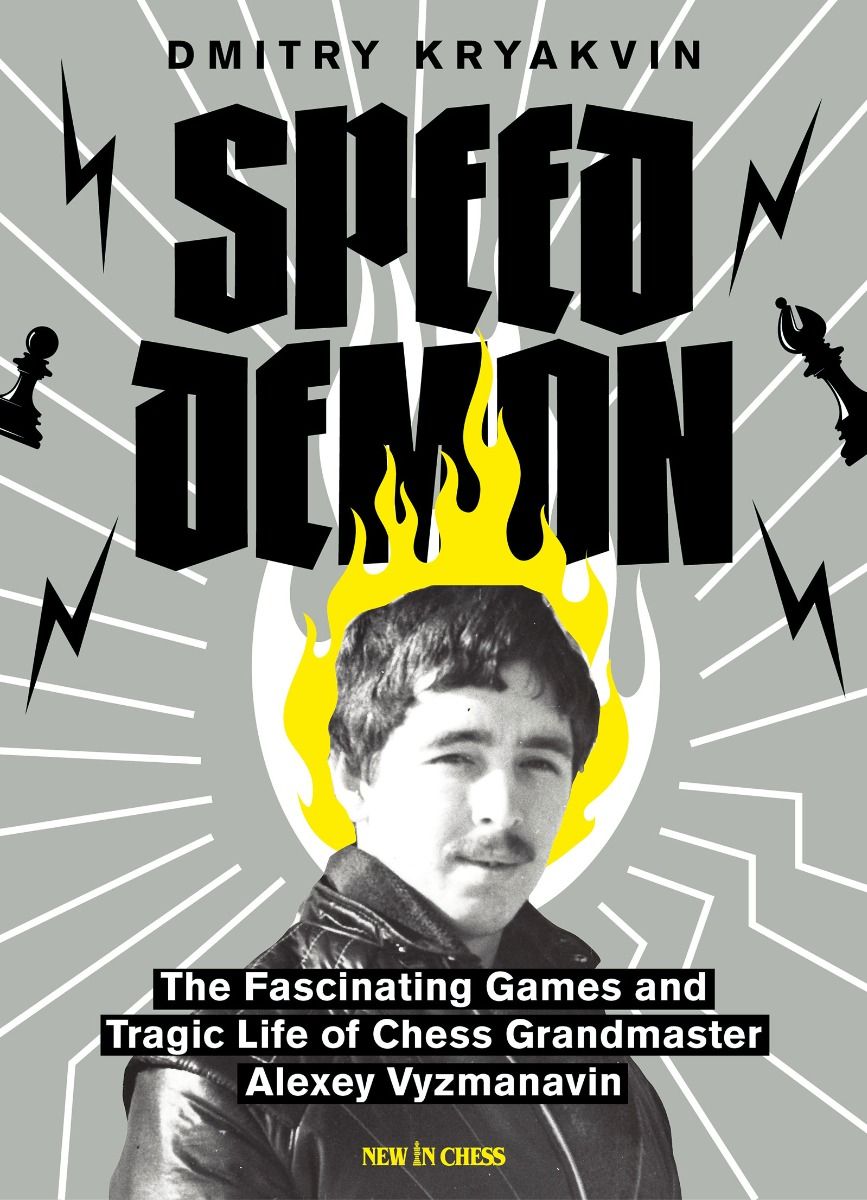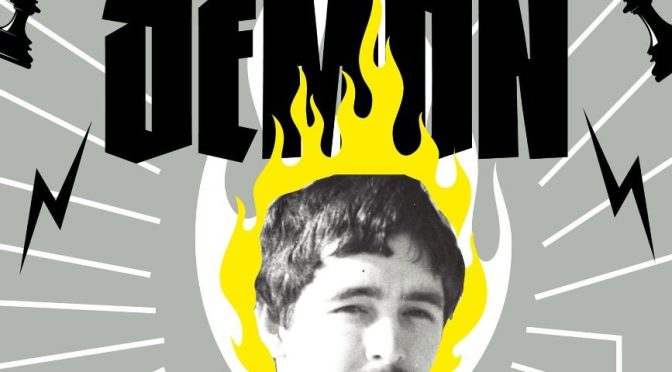From the publisher:
“Almost as fascinating as chess is the community of chess players. In every major city in the world, you are guaranteed to meet interesting people when you walk into a local chess club or chess cafe. This book pays tribute to one of those characters who gave colour to the chess world, the Russian grandmaster Alexey Vyzhmanavin.
The best chance to bump into Vyzhmanavin in the 1980s and early 1990s was in Sokolniki park in Moscow, playing blitz. You could meet him at the 1992 Chess Olympiad as a member of the winning Russian team. Or in the finals of the PCA rapid events of the 1990s, frequently outplaying his illustrious opponents with his fluent and enterprising style. In Moscow in 1994, he reached the semi-final, narrowly losing out to Vladimir Kramnik, having already beaten Alexei Shirov and Viktor Korchnoi. Commentating at a PCA event, Maurice Ashley described Vyzhmanavin in predatory terms: ‘He’s a dangerous one, looking like a cat, ready to pounce’.
For this book, grandmaster Dmitry Kryakvin has talked to dozens of people, enabling him to give a complete picture of Vyzhmanavin’s life. The result is a mix of fascinating chess, wonderful anecdotes, and some heartbreaking episodes. The stories are complemented by the memories of Vyzmanavin’s ex-wife Lyudmila. They revive his successes but also reveal the dark side of this forgotten chess genius who battled with depression and the ‘green serpent’, a Russian euphemism for alcoholism. He died in January 2000 at the age of forty, in circumstances that remain unclear. The stories and games in this book are his legacy.
Dmitry Kryakvin is an International Grandmaster from Russia and an experienced chess trainer and author. For New In Chess he wrote Attacking with g2-g4: The Modern Way to Get the Upper Hand in Chess”
————————————————————————————-
There’s always a demand for biographical works and games collections concerning lesser known players. Here we have a book about Alexey Vyzhmanavin, who, for a short time in the late 1980s and early 1990s, was one of the leading Soviet/Russian grandmasters.
Viorel Bologan provides the Foreword.
(Vyzhmanavin) was a very inventive and enterprising chess player, with deep and precise calculation skills. His best games featured in this book constitute great learning material. I must add that I rather liked the style of the book: it’s not a simple collection of best games – it’s a history of his life, bright and tragic. The narration of the author, Dmitry Kryakvin, is complemented by the memories of Vyzhmanavin’s ex-wife Lyudmila and stories from his friends.
Bright and tragic. This sums up Vyzhmanavin’s short life, with its highs and lows. A player of exceptional natural talent, particularly at speed chess, but his life blighted by his mental health problems and addictions to gambling and alcohol.
A fascinating book with an important story to tell – and some great chess along the way as well.
Right at the start, though, I should explain that I have one issue. Not, I suspect, to do with the book itself, but to do with what I assume was an editorial decision made by the publishers.
If I’m reading a Best Games collection I really want to see the complete games. Here, in the majority of cases, we don’t get all the moves, but only join the game after the opening, or, in some cases, at the start of the ending. This is something I find very frustrating: while it’s good to see how the winner exploited his advantage, I’d also like to know how he obtained that advantage in the first place, which might teach me something about the opening.
I appreciate that this is their house style, and that the decision was no doubt made for economic reasons, but for me it rather spoils what is otherwise an excellent book.
Vyzhmanavin had a difficult family background, with an alcoholic father. His mother was a kindergarten teacher, and he didn’t discover chess until his teens, when, accompanying his mother and her pupils to a summer camp, he chanced upon a chess book.
He had to start his playing career against much younger children, but, supported by Lyudmila Belavenets (daughter of pre-war Soviet master Sergey), he won books as prizes and rapidly became addicted to chess. As she later wrote: I am completely sure that it’s not necessary to start studying chess at the age of 4 or 6. When a teenager comes to the chess section, this means that it was his own choice.
I wholeheartedly agree with these sentiments.
Kryakvin writes:
We are all products of our childhood, and what we discuss here and now is very important in understanding what happened to Alexey Vyzhmanavin later. Alexey didn’t have any of the things that we love so much and sometimes value so little at home: warmth, loving and caring family members.
For him, much more than for most players, his childhood is the key to understanding both why and how he played chess.
He soon discovered the chess pavilion in Sokolniki Park in Moscow, where he honed his exceptional talent for blitz chess. By 1981, at the age of 20, he was beating players like Bronstein and Vaganian: you can see the games here.
By this time he had been conscripted into the armed forces. joining the sports unit, where he could pursue chess rather than military training. After his two year conscription period ended he signed up for another six years, winning the Armed Forces championship on seven occasions.
By 1985 he was approaching GM strength, winning this fine attacking game. Click on any move for a pop-up window.
By the late 1980s he was, like his father before him, experiencing problems with alcoholism and mental health, but in 1988 his life changed when he married a fellow chess player, Lyudmila Didenko, as she is now known. Soon after their marriage a daughter was born. Lyudmila’s moving recollections of Alexey play an important part in this book.
There was more good news in 1989 when Vyzhmanavin, now with a 2555 rating, finally attained the grandmaster title.
Here’s an example of his play from the following year.
He continued to progress, playing for the successful Russian Olympiad and European Championship teams in 1992, and reaching a peak rating of 2620 in 1993.
But, by the mid 1990s his problems with the ‘green serpent’ were getting worse. His results started to decline, and his marriage broke up, Lyudmila filing for divorce in 1996. He played little chess that year, and, despite sharing first place at Cappelle-la-Grande the following year, soon gave up completely.
By now his life had spiralled out of control, and, in January 2000, at the age of only 39, he was found dead in his Moscow flat.
A tragic story, then, of a talented but troubled man who was unable to control his demons.
As usual from this publisher, the book is well produced. The translation is excellent and the game annotations serve their purpose well. As is usual with New in Chess books, active learning is promoted by questions inviting readers to find the best continuation. Given that Vyzhmanavin excelled in positional chess, most of the questions involve planning rather than calculation. If you feel the purpose of this book is to inform rather than instruct, they’re not necessary, but they don’t do any harm.
If you’re interested in the human side of chess you’ll certainly want to read this book. If you’re interested in chess life in the last days of the Soviet Union, this is also a book for you. If you enjoy powerful positional chess, particularly in queen’s pawn games, you’ll learn something from this book. I’d suspect you’d have learnt rather more, though, if you’d been able to see the complete games rather than, in the majority, just the conclusion.
Dmitry Kryakvin has done an outstanding job in producing a fine tribute to Alexey Vyzhmanavin, a man who deserves to be remembered for both his life and his games.
Before I leave you, I have one further question prompted by reading this book. Should international and national chess organisations do more to help members of their community suffering from problems in the areas of mental health and addictions? I consider this an important topic which isn’t being discussed enough. Of course it’s quite possible that Vyzhmanavin might have turned down offers of help anyway, but what do you think?
Richard James, Twickenham 30th November 2023

Book Details:
- Softcover: 224 pages
- Publisher: New In Chess (31 January 2023)
- Language: English
- ISBN-10:9493257819
- ISBN-13:978-9493257818
- Product Dimensions: 17.15 x 1.19 x 23.09 cm
Official web site of New in Chess.


